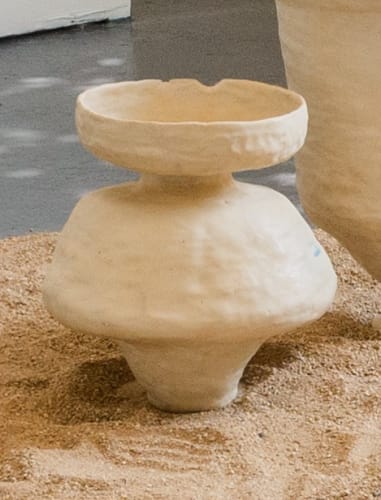Through a range of ceramic forms, the nine artists in Tender to the Bone expose relationships between malleability and calcification-the ossifying, changing, breaking, and "resoftening" parts of life.
Clay bodies, like living bodies (animal, environmental, etc.) are porous, vulnerable, and penetrable: microcosms of living and dying processes. Through a range of ceramic forms, the nine artists in “Tender to the Bone” expose relationships between malleability and calcification—the ossifying, changing, breaking, and “resoftening” parts of life. Here, material relationships between hard and soft/surface and interior/flesh and bone lead to deeper inquiries into the natures of desire, exhaustion, grief, and openness to change.
In her book “Keats’s Odes: A Lover’s Discourse,” writer Anahid Nersessian refers to the Latin term “remocellit,” used in Ovid’s telling of Pygmalion and his sculpture brought to life from stone. Though frequently translated to mean “softening,” the term more accurately means “resoftening” indicating something cyclical—phases of material change in relation to life and bodies or bodily forms. The sculpture thaws as it comes to life, as though alive before: “Softens then hardens, then softens again, reciprocal like living flesh,” Nersessian writes. Likewise, the works in Tender to the Bone explore how things that appear lost, buried, or solidified can reconstitute themselves as something else, from fragments of earth and forms mimicking natural landscapes to urns and vessels glazed with bone ash.
Many of these sculptures acknowledge that they are not yet in their final forms, quietly awaiting further metamorphoses, and open to the possibilities of being broken; being filled; being emptied; being touched and, perhaps, being changed because of it.


